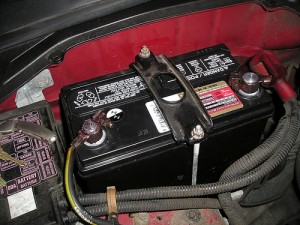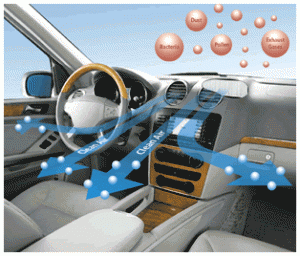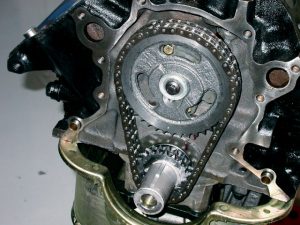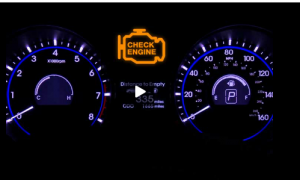 Express Car Care Tech Question:
Express Car Care Tech Question:
My name is Landon. I bought a new minivan and it started smoking out of the tail pipe. My service center said my head gasket went out. What can I do to prevent this from happening again?
Express Car Care Answer:
The head gasket fits between the top of the engine and the cylinder head. Its job is to seal that connection and keep oil and coolant circulating in the right parts of the engine.
When it leaks, oil can get in the coolant and vice versa. Sometimes coolant or engine oil can get into the combustion chamber where it gets burned with the fuel, which is what makes all the smoke that Landon was talking about.
He said his van was new, so it’s likely that the head gasket failed because it was improperly installed, which is very rare. Sometimes they just burn through.
Engine overheating is a leading cause for blown head gaskets. Following the schedule for cooling system service is a great way for drivers to avoid overheating.
Replacing a head gasket is a fairly expensive repair at most auto service shops. It’s definitely worth investing in regular cooling system maintenance at Express Car Care to avoid that pricey repair job. Ask your friendly and knowledgeable service adviser if it’s time for a cooling system service.

 When that car battery finally gives up the ghost and it’s time to replace it, drivers have options. First, let’s be clear that you should always get a replacement battery that meets or exceeds your vehicle’s specifications. But you may have some special needs. When they first put the battery into your vehicle at the factory, they had no idea where it would end up or how you would use it where you drive. That battery was chosen to meet the needs of a wide range of motorists. Replacement time is a good opportunity to talk to your service adviser about how you use your vehicle, so if it’s necessary you can get a battery upgrade.
When that car battery finally gives up the ghost and it’s time to replace it, drivers have options. First, let’s be clear that you should always get a replacement battery that meets or exceeds your vehicle’s specifications. But you may have some special needs. When they first put the battery into your vehicle at the factory, they had no idea where it would end up or how you would use it where you drive. That battery was chosen to meet the needs of a wide range of motorists. Replacement time is a good opportunity to talk to your service adviser about how you use your vehicle, so if it’s necessary you can get a battery upgrade. When Denver drivers take a corner in their vehicle, the outside wheels have a slightly longer distance to go than the inside wheels. That means that the outside wheels have to turn a bit faster than the inside. The piece of mechanical wizardry that makes this possible is called the differential.
When Denver drivers take a corner in their vehicle, the outside wheels have a slightly longer distance to go than the inside wheels. That means that the outside wheels have to turn a bit faster than the inside. The piece of mechanical wizardry that makes this possible is called the differential. Take care of your car and it will take care of you. Following basic car maintenance tips can help you stay on the road and out of the repair shop.
Take care of your car and it will take care of you. Following basic car maintenance tips can help you stay on the road and out of the repair shop. You’ve been looking forward to this trip for months. The kids are excited. You’ve even checked the pollen forecast, and you don’t anticipate any problems. The rental car looks perfect. You’ve reserved a four-wheel drive for this rugged adventure in the great outdoors. You get inside, take a deep breath, and start the car. Then it happens.
You’ve been looking forward to this trip for months. The kids are excited. You’ve even checked the pollen forecast, and you don’t anticipate any problems. The rental car looks perfect. You’ve reserved a four-wheel drive for this rugged adventure in the great outdoors. You get inside, take a deep breath, and start the car. Then it happens. As your engine runs, the intake valves need to open up to allow air into the engine. They remain closed while the air and fuel is compressed and ignited, powering the piston. Then the exhaust valves open to release the exhaust. This all has to be timed very precisely. It is the job of the timing belt or chain to make sure all of this is synced up properly.
As your engine runs, the intake valves need to open up to allow air into the engine. They remain closed while the air and fuel is compressed and ignited, powering the piston. Then the exhaust valves open to release the exhaust. This all has to be timed very precisely. It is the job of the timing belt or chain to make sure all of this is synced up properly. The power steering system in your vehicle is made up of several components that can cause problems after years of use. Some of these problems might be easy to catch as soon as they begin, but others might be less obvious, forcing you to have major parts replaced.
The power steering system in your vehicle is made up of several components that can cause problems after years of use. Some of these problems might be easy to catch as soon as they begin, but others might be less obvious, forcing you to have major parts replaced. The cooling system in an engine has five components: the radiator, the radiator cap, the hoses, the thermostat and the water pump. The water pump is literally the heart of the system. Just as your own heart keeps your blood circulating through your body, the water pump keeps coolant circulating through your engine.
The cooling system in an engine has five components: the radiator, the radiator cap, the hoses, the thermostat and the water pump. The water pump is literally the heart of the system. Just as your own heart keeps your blood circulating through your body, the water pump keeps coolant circulating through your engine. How long have you been enjoying the romantic glow of your Check Engine Light? Hey, it isn’t there to create ambiance in your vehicle; it’s a warning that says something is wrong.
How long have you been enjoying the romantic glow of your Check Engine Light? Hey, it isn’t there to create ambiance in your vehicle; it’s a warning that says something is wrong. Springtime is the perfect time to go through a vehicle maintenance checklist and get your car ready for the months ahead. We’ve put this one together so you know what should be checked out.
Springtime is the perfect time to go through a vehicle maintenance checklist and get your car ready for the months ahead. We’ve put this one together so you know what should be checked out.